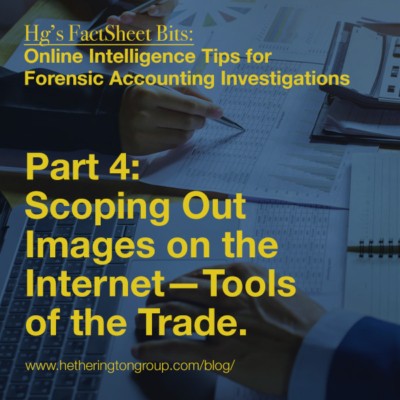 By Cynthia Hetherington
By Cynthia Hetherington
This past year I had the privilege to address The Canadian Institute of Chartered Business Valuators on the topic of online and cyber investigation applications. CBV is intensely interested in work efficiency, excellent content, and the resources that can support those endeavors. Our session was a great success and was included in the CBV Journal of Business Valuation 2020 Edition. The following is an excerpt of the session and article, in hopes of providing beneficial knowledge to information professionals, accountants, researchers and those cyber-curious truth seekers who, like CBV, value efficiency in their productivity.
This is an excerpt from Hg’s FactSheet, Online Intelligence Tips for Forensic Accounting Investigations. You can download the full report here.
Today in Forensic Accounting
In today’s data-intense, digital world we’ve all gone cyber in our endless quest for answers. Everything in the forensic accounting world, business valuations, and accounting involves data collection and fact checking. We are all invested in analyzing large datasets, finding anomalies, and extracting key information and insights.
Despite the variety of cybertools at our disposal—from optical characterization and recognition software to AI technology—an entirely different set of digital tools is proving especially useful to forensic accountants in tracking down and tracing the actions of people. The easiest to access and most readily available are open source, social media sites, search engines, and databases—some free, some not. That said, fee-based tools can hasten the investigative process, making it even more intelligent.
Following the resource tips described in this blog series will allow you to gather critical intelligence on people, historical topics, or events through public and not-so-public records without resorting to subterfuge or subverting security protocols. Understanding how these searches work—the data infrastructure or physical architecture of how information is disseminated, collected, captured, and stored—is crucial if obliged to explain your methodology to a client or testify as an expert witness in court. If uncertain about the authenticity of the information you’ve gleaned from open sources such as Facebook or Twitter, it is important that you state that clearly in a report, particularly if it serves as the basis for your analysis.
Image Searching Tools
When online searching for people based on their images, start with their professional profile photos on LinkedIn. This will make it easier to trace them across multiple platforms. Posting the same LinkedIn headshot to TinEye, Google Images, and Russian Dutch-domiciled Yandex will turn up a host of different leads to follow. You can also conduct searches using common buildings, landmarks, products, and other relevant images as your points of reference.
 TinEye
TinEye
TinEye is an online image search and recognition company, whose offerings include computer vision, machine learning, pattern recognition, and neural networks. Dragging and dropping a LinkedIn headshot along with its location (URL) into TinEye will turn up several matches, along with the date the photo was posted. This can prove useful in uncovering potential leads and tracking down related people of interest via posts about your subject.
 Google Images
Google Images
Google Images This digital tool is particularly effective in conducting product searches by location if, for example, you happen to be hunting down stolen goods being sold online. Click on the camera icon to drag and paste the image or, for best results, its URL into the search box. When conducting people searches, however, Images.Google results can often be too generic. For more leads, scroll past the initial assessment depicting similar-looking images to the pages featuring exact matches.
 Yandex
Yandex
Yandex is a Russian Dutch-domiciled international technology corporation headquartered in Moscow. Besides hailing as the largest search engine in Russia, Yandex provides 70 internet-related services and products, including search and information services. Although it works in a similar fashion to the other two image-matching tools, Yandex excels at connecting photo matches to an even broader array of websites. It also captures press releases and attended conferences, for example.

Hg OSINT TRAINING OPPORTUNITY: Open Source Intelligence—Start to Finish, an OSMOSIS Primer Webinar Series, 360 minutes, 6 CEUs
Designed as an online investigation’s primer, this series provides the basics of open source intelligence gathering to those entering the field. With three days of content, the field investigator will complete the 360 minutes of training with the tools needed to conduct open source intelligence investigations.
 RISK ASSESSMENT
RISK ASSESSMENT
Are you concerned about your company’s or employees’ points of vulnerability through online and open sources? Our skilled analysts are experts at removing personal information that puts you, your business partners, and your family at risk. Learn how our team can assist you in assessing and monitoring your risks.
 Cynthia Hetherington, MLS, MSM, CFE, CII is the founder and president of Hetherington Group, a consulting, publishing, and training firm that leads in due diligence, corporate intelligence, and cyber investigations by keeping pace with the latest security threats and assessments. She has authored three books on how to conduct investigations, is the publisher of the newsletter, Data2know: Internet and Online Intelligence, and annually trains thousands of investigators, security professionals, attorneys, accountants, auditors, military intelligence professionals, and federal, state, and local agencies on best practices in the public and private sectors.
Cynthia Hetherington, MLS, MSM, CFE, CII is the founder and president of Hetherington Group, a consulting, publishing, and training firm that leads in due diligence, corporate intelligence, and cyber investigations by keeping pace with the latest security threats and assessments. She has authored three books on how to conduct investigations, is the publisher of the newsletter, Data2know: Internet and Online Intelligence, and annually trains thousands of investigators, security professionals, attorneys, accountants, auditors, military intelligence professionals, and federal, state, and local agencies on best practices in the public and private sectors.



